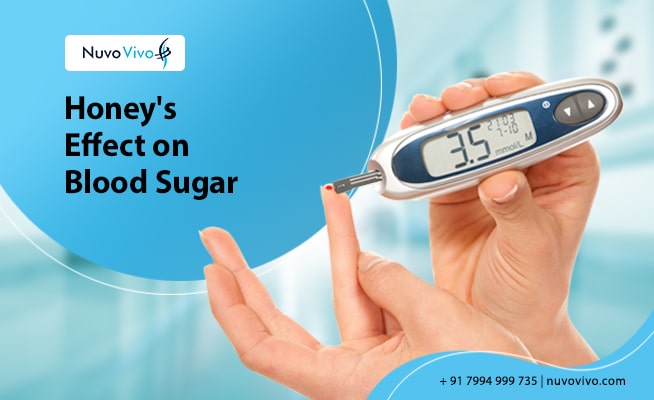Sugary foods might induce blood sugar levels to spike in diabetes people, and they need to avoid such foods. Diabetes patients must monitor and regulate their carbohydrate and sugar consumption.
Thus, it does not imply that they must abstain from all sweets. So, then comes the question, Is honey a healthy substitute for sugar in desserts and snacks? Or is honey good for people with diabetes? Various studies are undergoing when considering the consumption of honey in a diabetic person’s diet.
Some individuals use honey as a sweetener in their coffee and tea, as well as in baking. Is honey, however, safe for people with diabetes? The simple answer is No! Replacing other sweeteners like table sugar with honey does very little benefit for a diabetic person and is often not a great idea.
Honey is safe when consumed in moderation; it also possesses anti-inflammatory characteristics – thanks to rich antioxidant content. Even though honey is a better substitute as compared to table sugar, we all know that health is the most critical factor; one should be extremely careful when selecting their food menu, especially a diabetic patient.
What is Diabetes?
Diabetes is a condition marked by abnormally high glucose in our blood. As a result, people with diabetes must monitor and limit their carbohydrate consumption to maintain their blood sugar levels. At times, the body cannot make enough insulin or cannot use the insulin. As time progresses, it stays in the blood and never reaches the cells. This creates significant problems in health. Diabetes can be a life-threatening disease, but it can be cured and maintained with a healthy lifestyle.
What is Honey? What are its Different Types?
Honey is a sweetener, and it isn’t found naturally in other foods. Instead, you put it in your food to sweeten it. Honey is a carbohydrate-rich food. Glucose and fructose, both simple sugars, account for the majority of those carbs. It’s also referred to as “added sugar” on food labels.
The floral source is used to identify different honey varieties, but do you know that the flavor could vary drastically even if it were taken from the same flower in the same region? Because of the difference in temperature or rainfall, this is the case. In addition, honey with a lighter tint has a milder flavor than honey with a deeper color.
ALSO READ: IS JAGGERY GOOD FOR DIABETICS?
Raw Honey v/s Processed Honey
Honey can be classified as either raw or processed. Raw honey is regarded as more natural and purer than processed honey, cooked and bottled in a factory, losing vitamins, minerals, and other vital ingredients.
Processed honey is made in factories that are pasteurized with added flavors. These are of different types like Acacia Honey, Alfalfa Honey, Aster Honey, Avocado Honey, Basswood Honey, Beechwood Honey, Blueberry Honey, Bluegum Honey, and many more.
Raw honey includes specific components that are beneficial to one’s health. Some of these components, such as bee pollen, which has antioxidant and anti-inflammatory effects, may be removed or reduced by pasteurization and other methods. Propolis from bees is a glue-like material that keeps the hive together.
Nutritional Content of Honey
Honey is a sugar substitute. It has more calories than regular white sugar and is used in cooking and baking. If you’re using it as a replacement, you may need less because it’s sweeter. Honey also has a taste that white sugar lacks.
A tablespoon of honey provides the following nutrients:
- 64 calories
- 0-gram protein
- 0 gram of fat
- 17 grams of carbohydrates
- 0-gram fiber
- 17 grams of sugar
- Honey includes trace levels of vitamins and minerals
- Contains minor amounts of Potassium, Zinc, and Iron
How to Use Honey for Weight Gain or Weight Loss?

Keep in mind that a tablespoon of honey has roughly 63 calories, so go easy on it. Weight loss or weight gain depends on calorie intake, and hence excess honey is not a great idea, even for the non-diabetic population.
Substituting honey for sugar does have its benefits – thanks to its much better nutrient profile. Besides being rich in antioxidants, honey also contains various B -Vitamins and minerals such as zinc, phosphorus, magnesium, etc. Honey also has anti-bacterial and antiviral properties and can help relieve symptoms of cough and throat irritation. No studies, however, have shown that cinnamon plus honey can help you lose weight or even gain weight.
ALSO READ: CARDIO FOR WEIGHT LOSS?
Does Honey Contain Sugar?
Honey is composed primarily of water and two sugars: fructose and glucose. It also contains trace amounts of enzymes and amino acids. Thus, it can affect your blood sugar levels, albeit very minimally. Let us look at how it happens!
Honey’s Effect on Blood Sugar

Even though honey bees create honey, it is mostly made up of sugars. 100g of honey contains roughly 82 g of sugar on average, with fructose and glucose accounting for most of the overall sugar content.
Honey’s glycemic index is slightly lower than sugar’s (GI). The glycemic index (GI) is a measurement of how rapidly a meal raises blood sugar levels. Sugar has a GI of 60, whereas honey has a GI of 58. Honey, like other carbohydrates, raises blood sugar levels rapidly, although not as quickly as sugar does.
ALSO READ: Blood Pressure Treatment
Insulin and Honey
In particular research, honey has been shown to produce a larger insulin spike than other sweeteners. As a result, some people believe that honey is good for diabetics and might even prevent diabetes. However, this is not conclusively proven and is an undergoing subject of debate and research.
What Is Insulin and How Does It Work?
Insulin is a chemical messenger that lets cells take in glucose, a sugar, from the blood. The pancreas is an organ at the back of the belly. This is the principal supply of insulin withinside the body. Clusters of cells withinside the pancreas referred to as islets, produce the hormone and decide the quantity primarily based totally on blood glucose stages withinside the body. The better the extent of glucose, the extra insulin goes into manufacturing to stabilize sugar stages within the blood. Insulin additionally assists in breaking down fat or proteins for energy.
Can You Replace Honey with Sugar?

Diabetes impacts human beings: they cannot produce insulin (kind 1) or use insulin correctly (kind 2). Glucose (sugar) accumulates within the bloodstream while there is insufficient insulin or when it is not utilized correctly by the body, resulting in immoderate blood sugar levels.
As a result, the answer to the question “Can I replace honey for sugar” or “Can I eat honey even if I’m diabetic” is that honey, like any other sweetener, should be used in moderation because it may spike blood sugar levels. Honey consumption should be limited if your diabetes isn’t well controlled.
As honey is sweeter than white sugar, you won’t need as much to get the same sweetness level. When purchasing honey, make sure the sole component listed on the label is honey, with no additional sugars.
While honey contains certain nutrients beneficial to your health, you must consume significantly more than the recommended amount to reap any substantial benefits. should not be ingested in large amounts to obtain more vitamins and minerals, as other sources of these nutrients will significantly less impact blood sugar levels.
Honey is safe to consume by everyone over the age of one, even pregnant or nursing women. Due to the risk of newborn botulism, which may be transmitted by raw and pasteurized honey, honey should not be given to infants under 12 months.
The majority of honey sold in supermarkets has been filtered or pasteurized. Raw honey, on the other hand, is frequently untreated. If you’re concerned about food poisoning, use pasteurized honey that has been certified by a food inspector.
ALSO READ: HONEY & LEMON FOR WEIGHT LOSS
Honey v/s Sugar v/s Jaggery
Since jaggery is not processed like sugar, it is a preferable choice. However, because of its high glycemic index, jaggery is not recommended for people with diabetes. As opposed to the other two, honey is a better choice because it is less processed.
ALSO READ: SUGAR VS JAGGERY VS HONEY
Can a Diabetic Patient Have Honey?
Honey is considered an added sugar in the diet, even though it is natural. Those with diabetes, on the other hand, maybe able to enjoy high glycemic carbohydrates if consumed in moderation as part of a nutritious diet. Fiber-rich foods, including vegetables, fruit, whole grains, nuts, seeds, and legumes, can help control blood sugar levels.
To prevent overdoing it and creating hyperglycemia (i.e. high blood sugar levels), bear in mind the overall carbohydrate content of a meal when taking honey. Honey should be matched with other healthy, low-carbohydrate foods in every meal or snack.
Some folks prefer raw honey, which contains no added sugars. Raw honey might include pollen. Pollen and other solids, on the other hand, are filtered out of the process.
So, after going through this article, you might have got a clearer picture of the question, “can a diabetic eat honey?” Honey is rich in antioxidants, and the calorie value is also healthier. Hence, it can be included for a non-diabetic person, but remember to use it in moderation and live a healthier lifestyle. However, as far as a diabetic person is concerned, the benefits of honey do not provide any significant edge over other sweeteners like table sugar.

